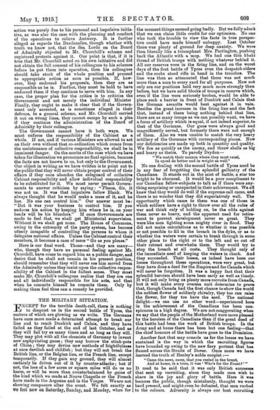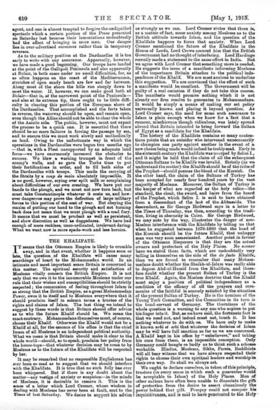THE MILITARY SITUATION.
EXCEPT for the terrible death-roll, there is nothing to disquiet us in the second battle of Ypres, the embers of which are glowing as we write. The Germans have once more made a determined attempt to break our line and to reach Dunkirk and Calais, and they have failed as they failed at the end of last October, and as they will fail try as many times and as long as they will. They may plot with all the chemists of Germany to invent new asphyxiating gases ; they may borrow the stink-pots of China ; they may devise new methods of frightfulness at once devilish and childish; but they will not break the British line, or the Belgian line, or the French line, except temporarily. If they gain any ground, they will almost certainly be driven out of it by counter-attacks ; but if not, the loss of a few acres or square miles will do us no harm, or will be more than counterbalanced by gains of the kind which we made at Neuve Chapelle or the French have made in the Argonne and in the Vosges. We are not showing composure after the event. We felt exactly as sae feel now on Saturday, Sunday, sod Monday, when for
the moment things seemed going badly. But we fully admit that we can claim little credit fur our optimism. No one who took the trouble to view the facts in true perspec- tive could have made himself unhappy. Last October there was plenty of ground for deep anxiety. We were then literally like a triumphant Mrs. Partington, pushing back the Atlantic with a mop. We had one thin khaki thread of British troops with nothing whatever behind it. All our reserves were in the firing line, and on the worst days of the first battle of Ypres even the despatch-riders and the cooks stood rifle in hand in the trenches. The line was then so attenuated that there was not much more than a man to every yard for all purposes. Now not only are our positions held very much more strongly than before, but we have solid blocks of troops in reserve which, even if the line were seriously broken, would be able to place such a barrier in front of Dunkirk and Calais that the German assaults would beat against it in vain. Besides the great increase in the firing line and the fact that, instead of there being nothing behind that line, there are as many troops as we can possibly want, we have a force of artillery which is equal, if not indeed superior, to that of the Germans. Our guns were always good and magnificently served, but formerly there were not enough of them. Also we were unable to match the very heavy artillery of the Germans with corresponding pieces. Now our deficiencies are made up both in quantity and quality. We fire as quickly as the enemy, and throw shells as big and heavy as theirs. To parody Dryden-
" We match their cannon where they most excel,
In speed do better and in weight as well."
No one dealing with the second battle of Ypres need be in any fear of forgetting the splendid gallantry of the Canadians. It stands out in the mist of battle, a star too bright to be obscured. It would be a poor compliment to our Canadian fellow-subjects to talk as if there were any- thing surprising or unexpected in their achievement. We all knew that they would do well if the supreme call came, and there is no wonder that they did superlatively well. The opportunity which came to them was one of those in which soldiers have a right to throw over all the rules of war and think only of holding on, be the odds against them never so heavy, and the apparent need for retire- ment to prevent envelopment never so great. They were like men fighting some mighty river in flood. They did not make calculations as to whether it was possible or not possible to fill in the breach in the dyke, or as to whether the waters were certain to break through in souse other place to the right or to the left and so cut off their retreat and overwhelm them. They would try to stop the breach at all costs. They thought only of the immediate need of keeping the waters in check. And they succeeded. Their losses, as indeed have been our losses throughout theme operations, were very great, but they have done a deed for the Empire and for Canada which will never be forgotten. It was a happy fact that their splendid heroism should have been early as well as timely. It will not only bring us plenty more recruits from Canada, but it will make every oversee unit determine to prove that, though Canada had the first chance to show the world the noblest flower of soldierly chivalry, they too can raise the flower, for they too have the seed. The national delight—we can use no other word—experienced here in the achievement of the Canadians has been con- spicuous in a high degree. We are not exaggerating when we say that the people of the Motherland were more pleased by the heroism of the Canadians than if the great deed of this battle had been the work of British troops. In the Army and at home there has been but one feeling—that the chief honours of the battle have gone to the Dominion.
Another fact that may console us for the losses we have sustained is the way in which the recruiting figures have bounded up owing to the new fiery portent that has flamed across the Straits of Dover. Once more we have learned the truth of Henley's noble couplet :— " Came the news, came, that you reeled in the brunt,
And at home, in a trice, it was • Who's for the Front?' "
It used to be said that it was only British successes that sent up recruiting, since they made men wish to share in the joy and glory of battle. Here it was because the public, though mistakenly, thought we were hard pressed, and might oven be defeated, that men rushed to the colours. Adversity is always our best recruiting
agent, and one is almost tempted to forgive the undignified spectacle which a certain portion of the Press presented on Saturday last because their lamentations undoubtedly had the effect of bringing in more men. Our danger lies in over-advertised successes rather than in temporary reverses.
As to the military position at the Dardanelles it is too early to write with any assurance. Apparently, however, we have made a good beginning. Our troops have landed at the point of the Gallipoli Peninsula and also apparently at Bulair, in both cases under no small difficulties, for, as so often happens on the coast of the Mediterranean, stretches of open sandy beach are few and far between. Along most of the shore the hills run steeply down to meet the water. 11, however, we can make good both at Bulair—that is, at the narrowest point of the Peninsula— and also at its extreme tip, there ought to be little diffi- culty in clearing this portion of the European shore of the Dardanelles. That accomplished and the forts taken in reverse, the waterway should be open, and remain open, even though the Allies should not be able to clear the whole of the Asiatic aide. The public, however, must not expect the process to be a quick one. It is essential that there should be no more failures in forcing the passage by sea, and to ensure this we must work slowly and methodically on land. Owing to the unfortunate way in which the operations in the Dardanelles were begun two months ago —that is, with a Fleet unsupported by an adequate land force—we have enormously increased the obstacles to success. We blew a warning trumpet in front of the enemy's walls, and so gave the Turks time to put their fortifications in order, and to fill both sides of the Dardanelles with troops. This made the carrying of the Straits by a coup de main absolutely impossible. It is no good, however, crying over spilt mills or complaining about difficulties of our own creating. We have put our hands to the plough, and we must not now turn back, but must take Constantinople whatever it costs us, and how- ever dangerous may prove the deflection of large military forces to this portion of the seat of war. But obeying the maxim of putting our hand to the plough and not turning back does not mean that we must plough with a mad fury. It means that we must be prudent as well as persistent, and show discretion as well as doggedneu. We have had enough of mere reckless, unco-ordinated, irrelevant daring. What we want now is more spade-work and leas heroics.



































 Previous page
Previous page